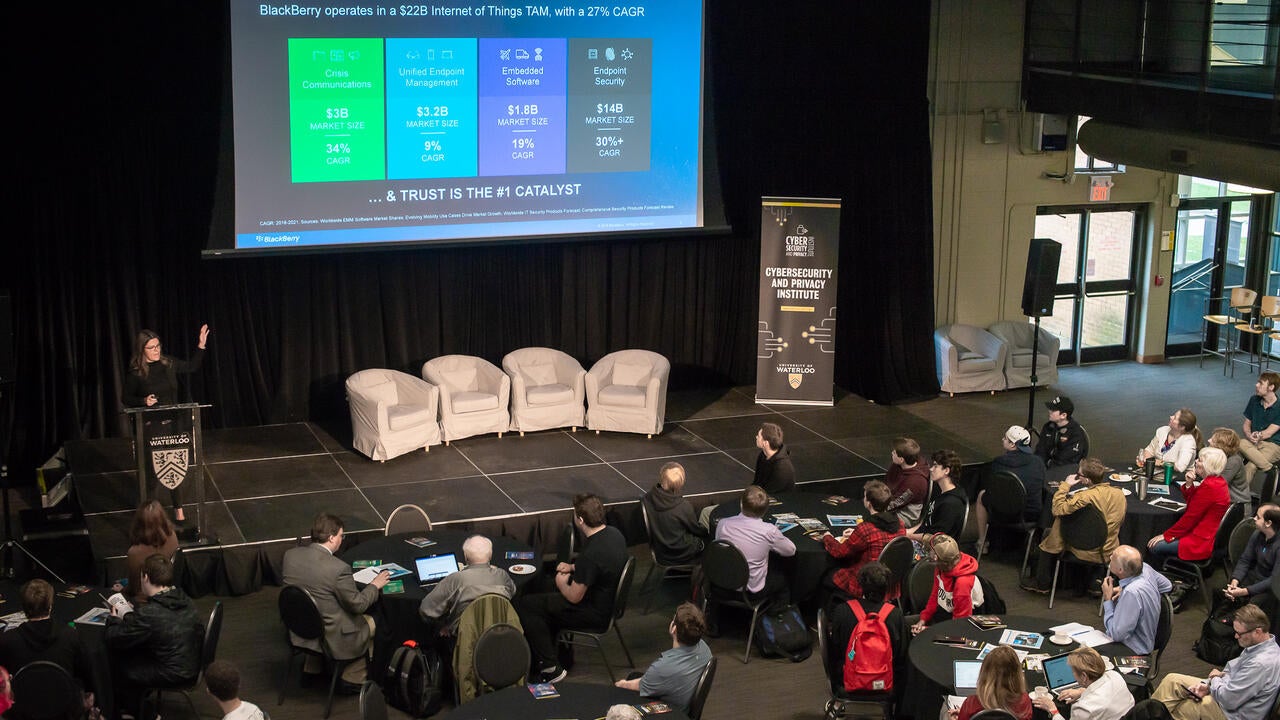
Canada’s leadership role in global cybersecurity
Cybersecurity and Privacy Institute hosts their annual conference

Cybersecurity and Privacy Institute hosts their annual conference
By Stephanie Longeway University RelationsThe Government of Canada recently announced a new national cybersecurity action plan to counteract the growing threat to our online security and privacy. And Canada’s role in fighting global cybersecurity was top of mind for speakers at the University of Waterloo’s Cybersecurity and Privacy Institute’s (CPI) annual conference on October 2.
Waterloo researchers, students and industry experts joined the rousing discussions on the current state of cybersecurity and how we can tackle the challenges facing our data and security in the digital age.
New threats often require new solutions.
Sarah Tatsis (BMath ’03, MMath ’04), BlackBerry’s vice-president of advanced technology development, asked the audience, “Who are the best problem solvers?”
Audience answers included students and researchers, but Tatsis replied that some of the best problem solvers are cybercriminals. It will take all the “good actors” working in the cybersecurity — government, researchers and industry professionals — to work together to solve privacy challenges head-on and outsmart cybercriminals.
Watch Tatsis explain the need for collaboration in problem-solving
“At the end of the day, cybersecurity is about humans protecting humans, from other humans,” said Tatsis. Cyberattacks impact our devices, and this is personal. It’s our data and our identities on the line.
Tatsis quipped, “the internet-of-things should really be called the internet-of-humans.”
This has spurred a new data economy, and it is not only hackers looking to get a hold of our personal data, companies and organizations are seeking access to this as well. Many of us blindly click “yes” when faced with long pages of terms and conditions from our smartphone apps without understanding what we are agree to.
Waterloo sociology and legal studies professor, Adam Molnar, spoke on the legal safeguards protecting our private data in Canada.
Canadian consumers and citizens expect the government to act on their behalf to regulate our privacy, but Molnar notes there are limitations to this. Policy and regulations have a hard time keeping up with the speed of innovation in the data economy.
Makers of digital devices need to take on the responsibility to build technology that is in the best interest of their consumers.
Hear Molnar discuss how Canadian companies should design trust into their devices
Marcel O’Gorman, Waterloo professor and director of the Critical Media Lab, shared statistics that consumers like the new technologies available, but do not trust the leaders of the companies producing them. This gap in trust is an opportunity that companies would be wise to tackle. Organizations that build trust with consumers may well reap the benefits of the competitive tech market.
The “Tech for Good” declaration was formed by Canadian stakeholders to encourage companies to build trust into their devices.
Watch O’Gorman lay out the principles organizations and tech developers need to adopt

Read more
Waterloo Innovation Summit reimagines health with technology

Read more
Waterloo researcher is using AI to make legal document review more effective and efficient

Read more
New partnership between NRC and Waterloo poised to advance AI, IoT, and cybersecurity — redefining the future of work
The University of Waterloo acknowledges that much of our work takes place on the traditional territory of the Neutral, Anishinaabeg, and Haudenosaunee peoples. Our main campus is situated on the Haldimand Tract, the land granted to the Six Nations that includes six miles on each side of the Grand River. Our active work toward reconciliation takes place across our campuses through research, learning, teaching, and community building, and is co-ordinated within the Office of Indigenous Relations.